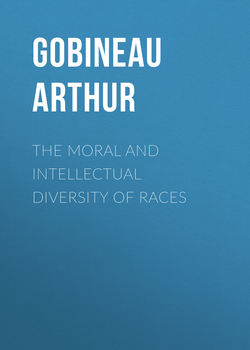Читать книгу The Moral and Intellectual Diversity of Races - Gobineau Arthur - Страница 1
EDITOR'S PREFACE
ОглавлениеIt has been truly observed that a good book seldom requires, and a bad one never deserves, a long preface. When a foreign book, however, is obtruded on the notice of the public, it is but just that the reasons for so doing should be explained; and, in the present case, this is the more necessary, as the title of the work might lead many to believe that it was intended to re-agitate the question of unity or plurality of the human species – a question which the majority of readers consider satisfactorily and forever settled by the words of Holy Writ. Such, however, is not the purpose of either the author or the editor. The design of this work is, to contribute toward the knowledge of the leading mental and moral characteristics of the various races of men which have subsisted from the dawn of history to the present era, and to ascertain, if possible, the degree to which they are susceptible of improvement. The annals of the world demonstrate beyond a doubt, that the different branches of the human family, like the individual members of a community, are endowed with capacities, different not only in degree but in kind, and that, in proportion to these endowments, they have contributed, and still contribute to that great march of progress of the human race, which we term civilization. To portray the nature of these endowments, to estimate the influence of each race in the destinies of all, and to point out the effects of mixture of races in the rise and fall of great empires, has been the task to the accomplishment of which, though too extensive for one man, the author has devoted his abilities. The troubles and sufferings of his native country, from sudden political gyrations, led him to speculate upon their causes, which he believes are to be traced to the great variety of incongruous ethnical elements composing the population of France. The deductions at which he arrived in that field of observation he subjected to the test of universal history; and the result of his studies for many years, facilitated by the experiences of a diplomatic career, are now before the American public in a translation. That a work, on so comprehensive a subject, should be exempt from error, cannot be expected, and is not pretended; but the aim is certainly a noble one, and its pursuit cannot be otherwise than instructive to the statesman and historian, and no less so to the general reader. In this country, it is peculiarly interesting and important, for not only is our immense territory the abode of the three best defined varieties of the human species – the white, the negro, and the Indian – to which the extensive immigration of the Chinese on our Pacific coast is rapidly adding a fourth, but the fusion of diverse nationalities is nowhere more rapid and complete; nowhere is the great problem of man's perfectibility being solved on a grander scale, or in a more decisive manner. While, then, nothing can be further removed from our intentions, or more repugnant to our sentiments, than to wage war on religion, or throw ridicule on the labors of the missionary and philanthropist, we thought it not a useless undertaking to lay before our countrymen the opinions of a European thinker, who, without straining or superseding texts to answer his purposes, or departing in any way from the pure spirit of Christianity, has reflected upon questions which with us are of immense moment and constant recurrence.
H. H.
Philadelphia, Nov. 1, 1855.
